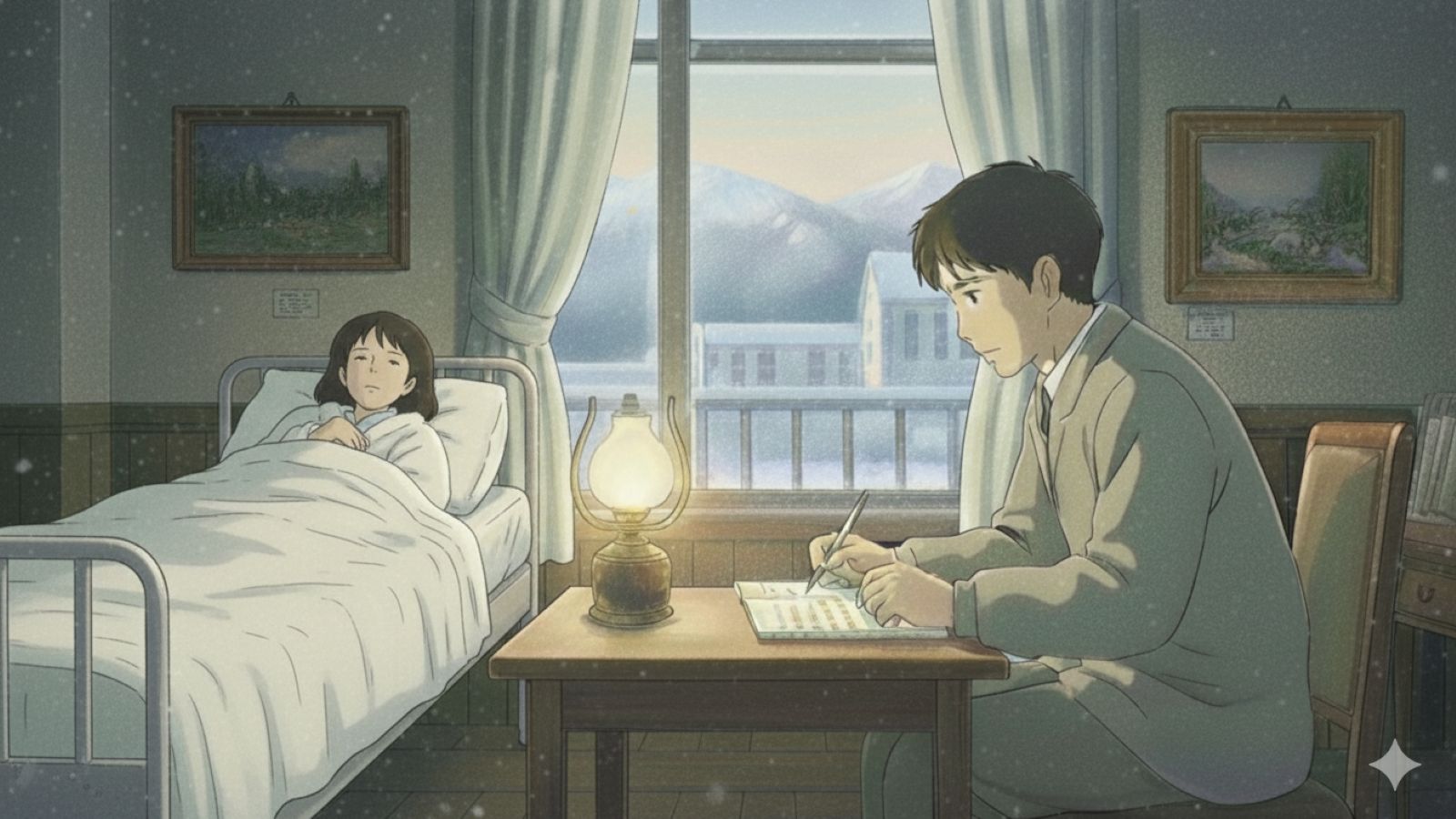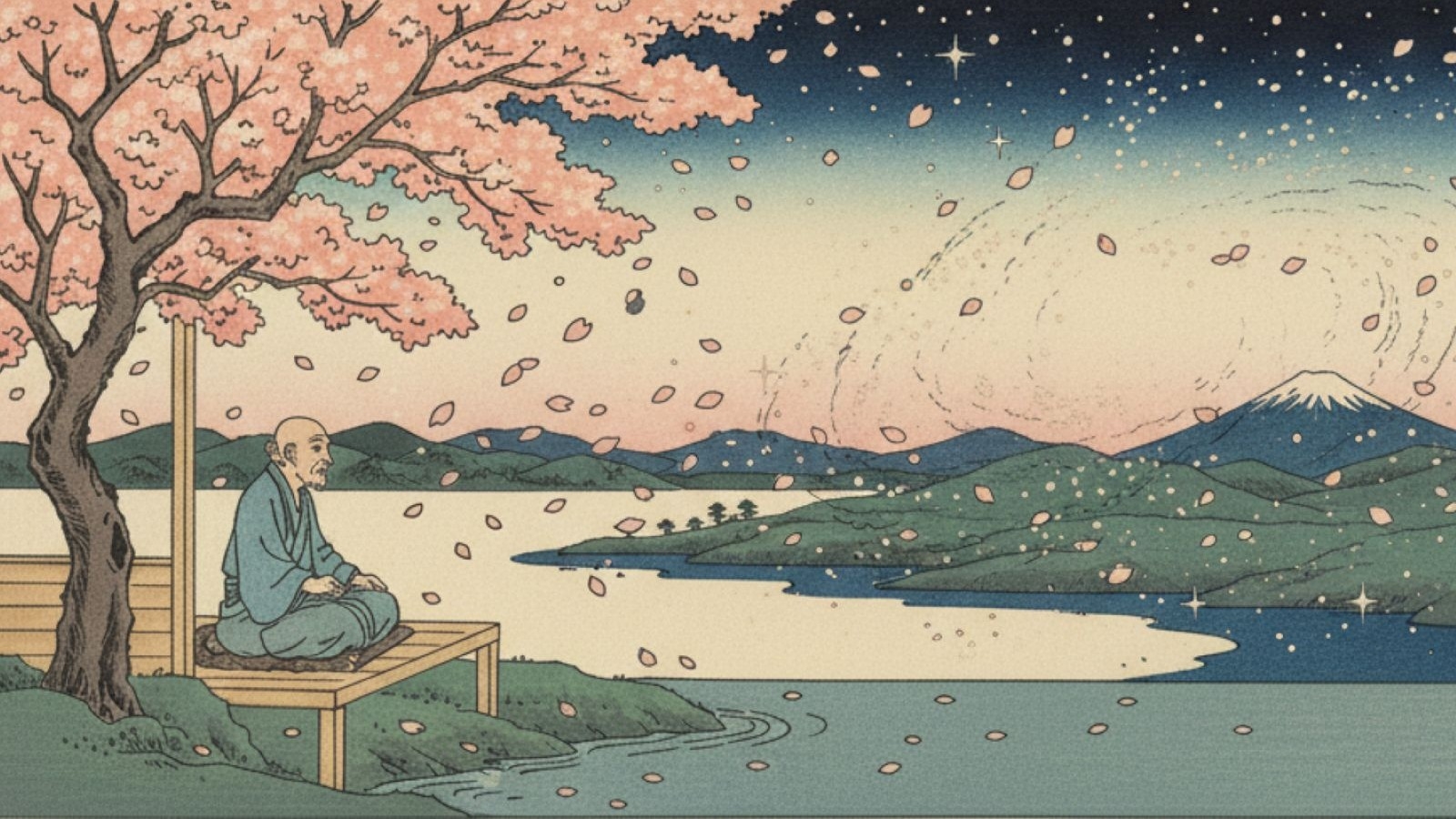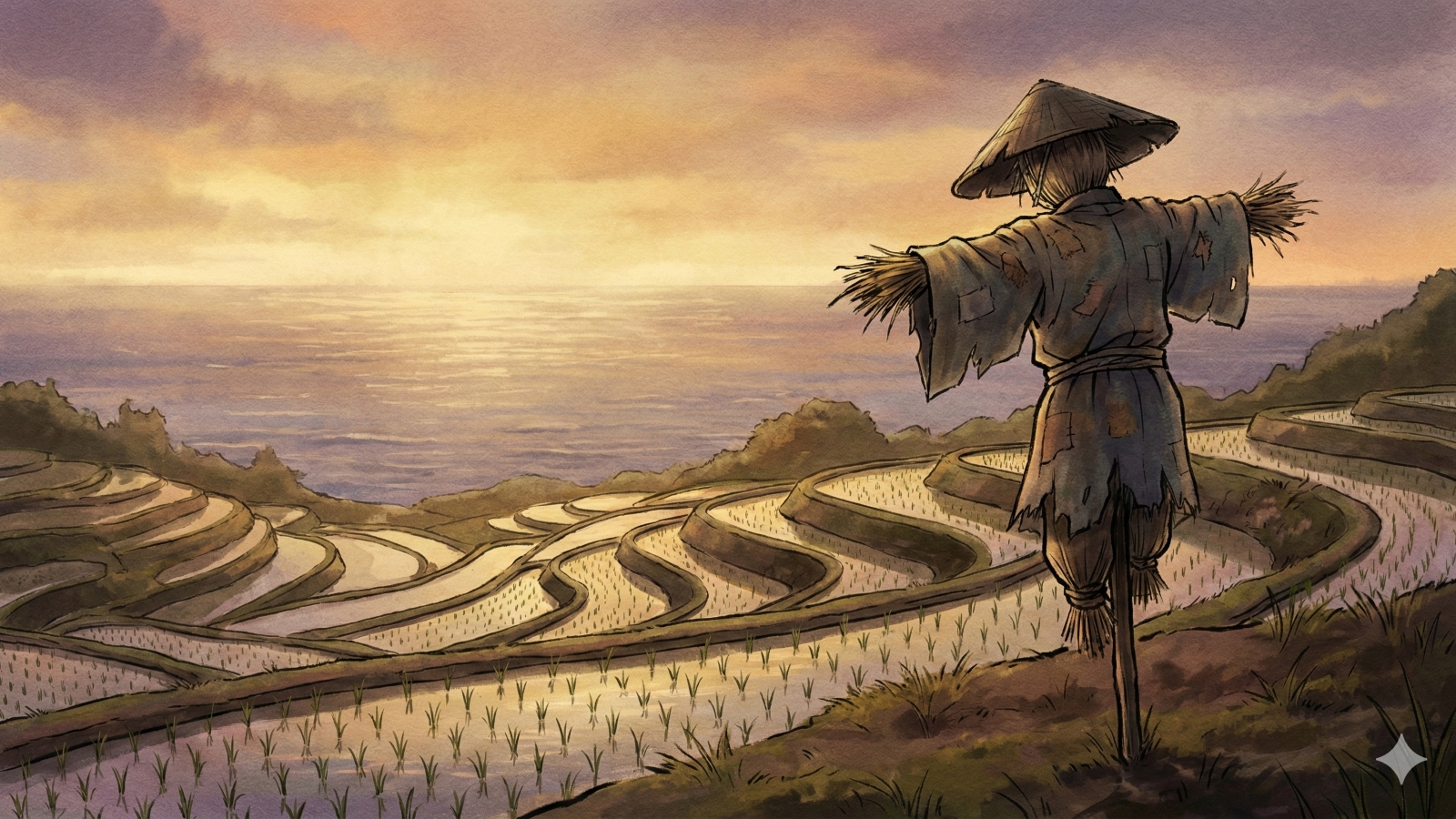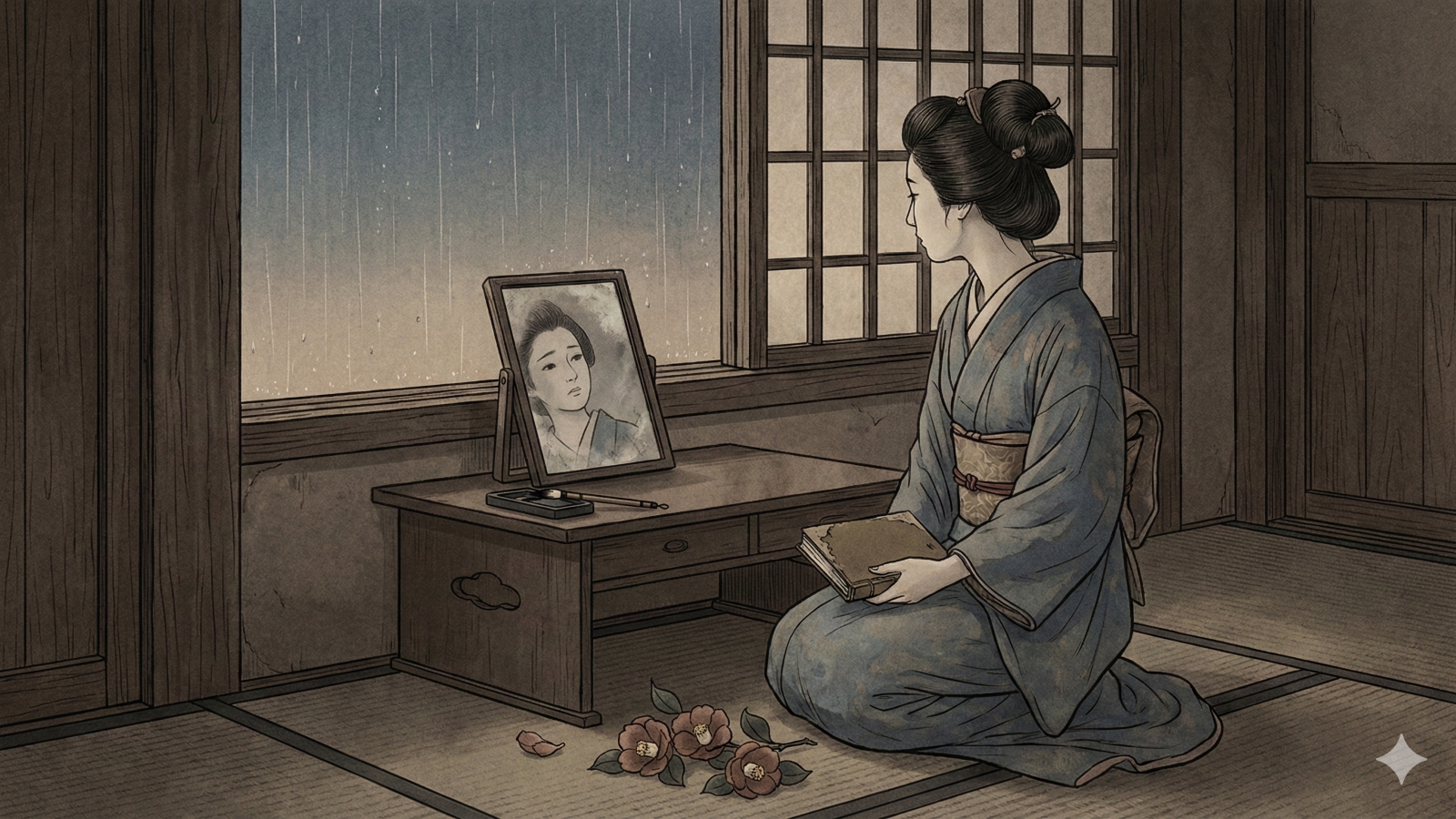The Eloquence of Silence - The Truth of the Unspoken Illuminated by Hori Tatsuo and Others
When we speak, something is lost; when we are silent, nothing is conveyed. We live our days on this frustrating boundary. Yet, perhaps what is truly important is hidden in the stillness that spreads between words. In this collection, we explore the rich meaning of "the unspoken," guided by the words of Tatsuo Hori, Soseki Natsume, and Tenshin Okakura. Why not listen closely to the voice of silence that lies behind eloquent words?

「沈黙がそんな言葉を気づかわしげに引きのばしていた。」
“Silence, as if with concern, was drawing out those words.”
— Tatsuo Hori, The Wind Has Risen
[Commentary]
The silence between words is not an empty space, but a time pregnant with meaning. This line depicts a tense scene where the fiancée, Setsuko, after voicing her anxiety about her illness, suddenly confesses, “I’ve started wanting to live.” The author personifies the quiet as she searches for her next words, as if it were a being with its own will. This silence functions as a device to condense unvoiced emotions like hesitation and resolve. It can be said to play a role that, in turn, highlights the weight of speaking. That is why the confession, when it finally breaks the silence, carries an all the more poignant resonance.
「私はすぐ何か答えたかったが、何んの言葉も私の口からは出て来なかった。」
“I wanted to answer right away, but no words would come out of my mouth.”
— Tatsuo Hori, The Wind Has Risen
[Commentary]
Have you ever found that the stronger your desire to convey something, the harder it is to find the words? Having sensed the severity of her own illness, Setsuko resolutely tells the protagonist, “Let’s live as long as we can.” In response to these words, so brave and strong, the protagonist is too shocked to reply. His silence represents a vortex of emotions beyond agreement or objection, something that cannot be fully expressed in words. The silence here is not just an absence of words, but a form of response in itself—one in which a thousand feelings of surprise, sorrow, and love are condensed.
「そう云った誰も知らないような、おれ達だけのものを、おれはもっと確実なものに […] 置き換えたいのだ。」
“This thing that only we know, that no one else does, I want to replace it with something more certain […].”
— Tatsuo Hori, The Wind Has Risen [I]
[Commentary]
When you experience a happiness that words cannot describe, how do you try to hold onto it? This passage comes from a scene where the protagonist, “I,” living with his fiancée Setsuko at a sanatorium in the highlands, resolves to write down the happiness of their limited time together in a novel. Amid a daily life tinged with the shadow of death, there is a small yet certain joy of being alive. It was a formless treasure that only the two of them could share. The protagonist attempts to make that ineffable happiness eternal by replacing it with “something more certain”—words. This attempt seems to symbolize both the fragility of happiness itself and the poignant human desire to somehow capture it. While some things are lost when put into words, other things will vanish if they are not. One can almost picture the protagonist taking up his pen, caught in this very dilemma.
「義務心を持っていない自由は本当の自由ではないと考えます。」
“I believe that freedom without a sense of duty is not true freedom.”
— Soseki Natsume, My Individualism
[Commentary]
If words carried no responsibility, what kind of chaos would the world fall into? Soseki notes that British society, which values freedom, is simultaneously supported by a strong sense of duty. The freedom they enjoy is not about acting as they please, but is the flip side of the duty to respect the freedom of others. If we apply this to “words,” it can be interpreted that freedom of expression must also be accompanied by responsibility for the impact of those words. The freedom to say anything is nothing more than selfishness that hurts others and disrupts social order. This sentence quietly suggests that the act of speaking should always be accompanied by the silent duty of consideration for the person receiving the words.
「国家は大切かも知れないが、そう朝から晩まで国家国家と云ってあたかも国家に取りつかれたような真似はとうてい我々にできる話でない。」
“The state may be important, but we could never act as if possessed by it, chanting ‘state, state’ from morning till night.”
— Soseki Natsume, My Individualism [Soseki Natsume]
[Commentary]
If the words shouted the loudest are in fact the most hollow, what should we believe in? This is a statement Soseki made during his student days when refuting the claims of a nationalist group. He expressed a strong sense of unease with the trend of thought becoming possessed by simply repeating the word “state.” When words become slogans devoid of real feeling, they can become tools that halt thought rather than enrich it. The contrast between the emptiness behind eloquent words and the solid sense of the individual who is not swayed by them is brilliantly depicted. Perhaps truth lies not in words that trumpet a great cause, but in the quiet, near-silent activities rooted in daily life.
「淋しいと云えば、偽りである。淋しからずと云えば、長い説明が入る。」
“To say I am lonely would be a lie. To say I am not would require a long explanation.”
— Soseki Natsume, Kusamakura
[Commentary]
Have you ever been in a state of mind where speaking would be a lie, but staying silent would convey nothing? At an inn during his travels, the protagonist, a painter, is asked by a priest, “You must be lonely by yourself.” However, his state of mind is too complex to be summed up by simple “loneliness.” To agree easily would be a lie, yet to deny it would require a long, graceless explanation. This sentence aptly expresses the frustration that words, as a tool, cannot capture the delicate nuances of the heart. Sometimes, silence can be an honest choice to avoid misrepresenting one’s true feelings with facile words.
「もし橋畔に立って、行く人の心に
“If one could stand by a bridge and hear every single conflict coiled in the hearts of the passersby, this fleeting world would become dizzying and hard to live in.”
— Soseki Natsume, Kusamakura
[Commentary]
If we could hear all the inner voices of others, how would this world change? The protagonist, watching a fisherman on the bank from a boat, reflects on the hustle and bustle of the city, where people pass each other with mutual indifference. The countless unspoken conflicts hidden in the hearts of passersby. He thinks that if he knew all of them, the weight would be so great that it would make him dizzy, and this world would be hard to live in. Perhaps we can live peacefully because our inner worlds are shrouded in a veil of silence, allowing us not to know too much about each other. Silence, at times, serves as an invisible wall that protects the peace of society.
「容易に説明のできるところになんの大教理が存しよう。」
“What great doctrine exists in that which can be easily explained?”
— Tenshin Okakura, The Book of Tea (translated by Hiroshi Muraoka)
[Commentary]
How much value do we find in things that can be easily explained with words? This book unravels the cultural misunderstandings between the West and the East while explaining the Taoist and Zen philosophies that form the spiritual background of the tea ceremony. This passage points out that truly great teachings and truths cannot be systematized with simple words. Rather, the author seems to believe that profound meaning, which cannot be captured by words, resides in paradox and silence. The words we use may be like small boats floating on the vast ocean of silence.
「彼らが断末魔の苦しみに叫んだとても、その声はわれらの無情の耳へは決して達しない。」
“Even if they cry out in the agony of death, their voices will never reach our unfeeling ears.”
— Tenshin Okakura, The Book of Tea (translated by Hiroshi Muraoka)
[Commentary]
How much do we listen to the cries of the voiceless? The author views the Western treatment of flowers as consumption for the sake of flaunting wealth and laments its heartlessness. This passage personifies the flowers that are carelessly picked and discarded, protesting that their silent death cries are never heard due to human insensitivity. It sharply points out the lack of imagination for the sacrifice that lies behind beauty. The “voice” of the flowers spoken of here is a symbol of the unspeakable suffering of beings without words. Our silence can sometimes become a cruel wall that ignores the pain of others. This passage quietly asks if the truth of the world might be hidden in voices that cannot be put into words.
「直覚というは […] ただありのままの事実を知るのである。」
“Intuition […] is simply to know the facts as they are.”
— Kitaro Nishida, An Inquiry into the Good
[Commentary]
Knowing the truth is like gazing at a landscape as it is, before attaching any labels with words. This text argues for the importance of direct, indubitable experience—that is, “intuition”—as the starting point for philosophical inquiry. We tend to immediately judge and classify things with words. However, the author states that prior to such judgments, there is a pure experience of simply knowing the facts as they appear to consciousness. This is nothing less than touching the world in its pre-verbal state, a realm of “silence,” so to speak. It suggests a fundamental way of perception that exists before all knowledge and words are born, making us contemplate the limits of language and the quiet truth that lies just before it.
(Editorial Cooperation: Haruna Ishita, Momona Sassa)

Japanese Views on Seasons - The Gaze of Literary Figures
Japanese literary figures have deeply engaged with the shifting seasons and the workings of life through various forms of expression such as novels and essays. Their delicate sensibilities and keen powers of observation open the door to a dialogue with nature for us, teaching us the beauty and philosophy hidden within everyday landscapes.

Japan's Primal Landscapes - A Tale of Memories Told by the Land
Superimposing the deceased onto the buzzing of flies, seeing gods in one-legged scarecrows. For Japanese people, these mysterious stories were not fantasy, but "life" itself, right next door. Longing for lands beyond the sea, legends remaining in ancient mounds. Why not travel through the frightening yet gentle "primal landscapes of the heart" gathered by Kunio Yanagita, Lafcadio Hearn, and others?

To Wonders Beyond Logic - The Beautiful Abyss Peered into by Scientists
Science is not just cold calculations. It is awe for nature beyond human understanding and an endless quest for beauty. Seeing the universe in a snowflake, feeling the ferocity of life in roadside grass... These are the adventurers of knowledge who confronted the overwhelming "mysteries" that appear only at the end of logic. We touch upon the records of their quiet yet passionate souls.

The Soul Screaming "I" - Stories of Fate and Pride by Modern Women
Should women's lives be plastered over with resignation to fate? Or is it a battle to break through social barriers and win one's own "life"? The dry self-mockery spat out by Ichiyō, the poignant scream released by Akiko for her beloved. We listen to the cries of their souls as they resisted the chains of their era, struggling through the mud to establish the "self."